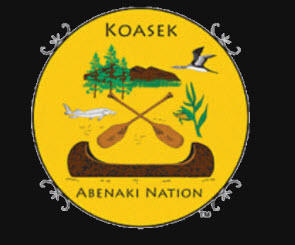
Our Native Abenaki Corn Comes Home after 300 Years
On Sunday, September 17, 2006, Charlie and Sarah Calley of Newbury, Vermont returned some Abenaki corn seeds to our Koasek chief Nancy Millette which was a great honor to our people after 300 years. Though it may seem like a small gesture on behalf of the Calley’s, it meant a lot to our Koasek tribal members who gathered to receive the gift.
Our Co-Chief Brian Chenevert was very pleased at this historic moment. As customary after receiving a gift, the Abenaki always give a gift in return. The Calley’s received some Indian sage, an item used for prayer – a small Abenaki basket and a T-shirt bearing the name of the Koasek Abenaki Tribe.
A Cherished Tradition Centuries before the arrival of English settlers in the 1760s, thenative Abenaki people grew corn on the fields on both sides of the Connecticut River according tohistorical information gathered by Charlie and Sarah Calley.
When the settlers arrived, they obtained corn seeds from the Indians and continued growing it, always saving enough seed for next year’splanting. The process of planting this corn which only grows about waist high and produces one four-inch ear per stalk, was passed down through the generations of the settlers and eventually came to the family ofthe late Carroll Greene. The Calley’s met the Greene’s in 1973. The Greene’s eventually gave the Calleys several ears of dried seed corn and asked them to keep the process going.
Every spring since 1973, the Calley’s said, they have planted the seed, thinning and weeding the rows and enjoying the corn, which comes early, usually in July. The Calley’s said the corn withstands drought very well thrives in a wet summer and never gets diseased.The Koasek Abenaki Tribe redistributed the seeds and start replenishing the corn. The day after our pow wow, several members plus Chief Brian Chenevert went to a nearby garden and planted the corn seeds for the first time. The event was very exciting.

